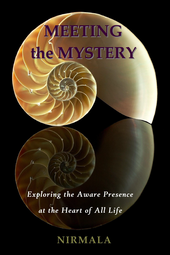Q: Over the past eight years I have developed a personal relationship with a God of my understanding – or should I say with a God of my non understanding and I know that the term God is loaded and perhaps not word enough. I love God and naturally want to be with God.
I have some experience of Hinduism and spent time studying Buddhism, I even spent time living at a Buddhist center while going about my ordinary business of work, life and family. I couldn’t continue with Buddhism even though they were wonderful people because in my heart I knew it was not the right path for me and I felt conflicted. I returned to my love of Hindu practices because it felt more right for me and over the past two years I have tried to find my way. I have deepened my understanding through reading books, internet teachings on you tube and meditation.
More recently I have ventured upon Advaita Vedanta and it feels right for me. However, I have no teacher and no one to ask when I have questions. Sometimes it all gets a bit too non dual for me and I feel disconnected from the love part with all the philosophy and intellectual explanations. I experienced the grace of God eight years ago when I was in a desperate plight and Divine Grace is an absolute for me. What I want to know is how does Grace happen, is it Brahman or Divine consciousnesses. Thank you for any time and consideration you might give to answer my question. Continue reading

